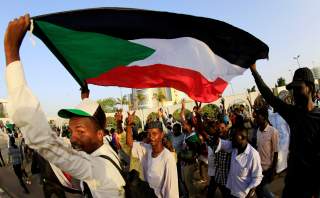Sudan's Political Turmoil Creates Window of Opportunity for Washington
America can work to stymie Sudanese military support for the war effort in Yemen by helping to improve economic conditions in Sudan.
Sudanese protestors succeeded in ousting long-term president Omar al-Bashir in a military coup in early April. Both protestors and international observers saw this feat as a major victory following months of public demonstrations over rising food and fuel prices. However, months later, at a June 3 sit-in demonstration, the military opened fire on civilian protesters, killing more than one hundred people—an act of violence that showed the protestors’ victory was limited. While the United States has shown little interest in the conflict, it should capitalize on this key opportunity to advance its own interests in the Middle East and North Africa region. In the short term, the focus should be on Sudan’s involvement in the Saudi-led campaign in Yemen against Houthi rebels. Since the start of the conflict, there have been around fourteen thousand Sudanese militiamen fighting alongside Saudi-aligned Yemeni militias. By helping to ensure a smooth transition of power, the United States can work to stymie Sudanese military support for the war effort in Yemen by helping to improve economic conditions in Sudan. If the United States does not step in early to contain the situation, then there is a heightened threat that the lack of regime stability could engender increased terrorism by creating a power vacuum in a region that is already suffering from a proliferation of terrorist groups in places such as Libya, Somalia, and Yemen.
Regional actors such as the Gulf Cooperation Council, or GCC, have sided with Lt. Gen. Abdel Fattah al-Burhan, the leader of the military transitional council. On April 21, 2019, Saudi Arabia and the UAE committed $3 billion in financial support to the council. Sudanese militiamen also constitute a significant component of coalition forces in Yemen, thus enabling Saudi Arabia and the Emirates to conduct military operations without needing to deploy large numbers of their own soldiers. It sustains this sizeable mercenary force by paying them high salaries compared to what they received back in Sudan. “They were paid in Saudi riyals, the equivalent of about $480 a month for a fourteen-year-old novice to about $530 a month for an experienced Janjaweed officer,” according to the New York Times. “They received an additional $185 to $285 for any month they saw combat.” This financial package includes a one-time payment of $10,000 at the end of a six-month rotation. Apart from keeping Sudan involved in Yemen, Saudi Arabia has a vested interest in the outcome of the uprising out of a desire to install a friendly regime in the country. The Muslim Brotherhood also presents a threat, since the movement was actively involved in Sudanese politics during the Bashir period and still retain substantial influence in the country. There is also the additional risk that Qatar will increase its own influence in the region as it already established a port on the Red Sea in March 2018.
Therefore, despite the fact that the uprising in Sudan was between the people and the state, other Middle Eastern countries are deeply invested in the outcome of the dispute. Unfortunately, their goals do not align with the interests of the people nor with the interests of the United States.
While the United States has avoided interfering in the protests that began late last year, the opportunity to reform the political environment in Sudan poses an immense opportunity that would be advantageous for the U.S. interests in Yemen. Congress has already pulled American political support for the coalition, and there is currently a bipartisan effort in the legislature to end U.S. funding to aid Saudi Arabia. However, President Donald Trump has vetoed any such initiative.
If the United States engages in Sudan by helping negotiate the election of a civilian leader and revitalizing the country’s economy, then the United States could stop this flow of Sudanese soldiers to Yemen. This would indirectly weaken Saudi Arabia’s position in the Yemeni conflict while preserving Sudan’s diplomatic ties to the kingdom.
Nevertheless, these actions would necessitate that the United States engage in diplomacy with a country that it claimed was a “state sponsor of terrorism” back in 1993. Given this designation, the United States has more of an impetus to work to ensure a peaceful transition of power, since the absence of a strong central government in Sudan would present greater opportunities for terrorist networks such as Al Qaeda and ISIS to take root in Sudan.
By reaching out to the new Sudanese government, not only would the United States be in a position to gain a new regional partner, but it would also be preventing a new cycle of conflict in the country—one that could spill over into the wider region, which would then require more extensive U.S. military intervention.
Joe Boueiz is an intern for the Middle East Studies Program at the Center for the National Interest. He is currently doing his Masters in Global Policy Studies at the Lyndon B. Johnson School of Public Affairs at the University of Texas at Austin, specializing in Middle East affairs, regional security, terrorism, and the foreign policies of emerging and developing nations in the MENA region.
Olivia Giles is an intern for the Middle East Studies Program at the Center for the National Interest. She is a senior at Bowdoin College in Brunswick, Maine where she is majoring in Government and Legal Studies with a concentration in comparative politics in the Middle East and Africa.
Image: Reuters

